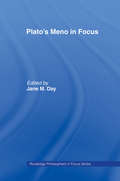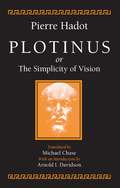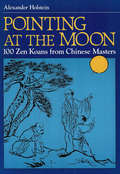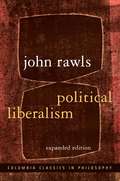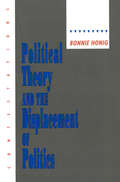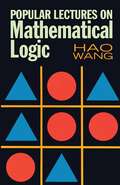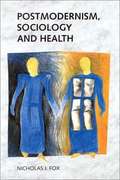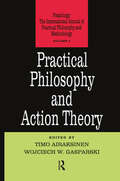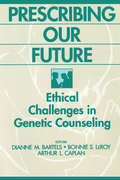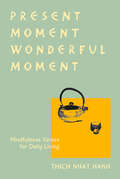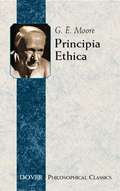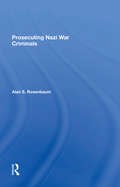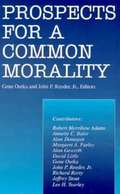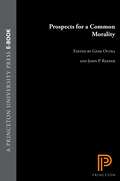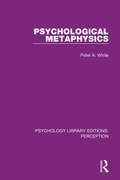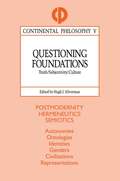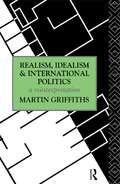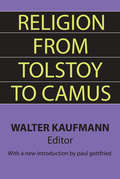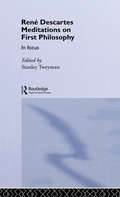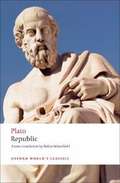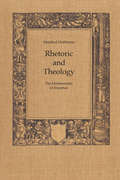- Table View
- List View
Philosophical Imagination and Cultural Memory: Appropriating Historical Traditions
by Patricia CookDoes philosophy have a future? Postmodern thought, with its rejection of claims to absolute truth or moral objectivity, would seem to put the philosophical enterprise in jeopardy. In this volume some of today's most influential thinkers face the question of philosophy's future and find an answer in its past. Their efforts show how historical traditions are currently being appropriated by philosophy, how some of the most provocative questions confronted by philosophers are given their impetus and direction by cultural memory.Unlike analytic philosophy, a discipline supposedly liberated from any manifestation of cultural memory, the movement represented by these essays demonstrates how the inquiries, narratives, traditions, and events of our cultural past can mediate some of the most interesting exercises of the present-day philosophical imagination. Attesting to the power of historical tradition to enhance and redirect the prospects of philosophy these essays exemplify a new mode of doing philosophy. The product of a National Endowment for the Humanities Summer Institute in 1990, it is the task of this book to show that history can be reclaimed by philosophy and resurrected in postmodernity.Contributors. George Allan, Eva T. H. Brann, Arthur C. Danto, Lynn S. Joy, George L. Kline, George R. Lucas, Jr., Alasdair MacIntyre, Robert C. Neville, John Rickard, Stanley Rosen, J. B. Scheenwind, Donald Phillip Verene
Plato's Meno In Focus (Philosophers in Focus)
by Jane M. DayIn one volume, this book brings together a new English translation of Plato's Meno, a selection of illuminating articles on themes in the dialogue published between 1965 and 1985 and an introduction setting the Meno in its historical context and opening up the key philosophical issues which the various articles discuss. A glossary is provided which briefly introduces some of the key terms and indicates how they are translated. The Meno is an excellent introduction to Plato and philosophy.
Plotinus or the Simplicity of Vision
by Pierre HadotSince its original publication in France in 1963, Pierre Hadot's lively philosophical portrait of Plotinus remains the preeminent introduction to the man and his thought. Michael Chase's lucid translation—complete with a useful chronology and analytical bibliography—at last makes this book available to the English-speaking world. Hadot carefully examines Plotinus's views on the self, existence, love, virtue, gentleness, and solitude. He shows that Plotinus, like other philosophers of his day, believed that Plato and Aristotle had already articulated the essential truths; for him, the purpose of practicing philosophy was not to profess new truths but to engage in spiritual exercises so as to live philosophically. Seen in this light, Plotinus's counsel against fixation on the body and all earthly matters stemmed not from disgust or fear, but rather from his awareness of the negative effect that bodily preoccupation and material concern could have on spiritual exercises.
Pointing at the Moon
by Alexander HolsteinPointing at the Moon comprises one hundred brilliant examples of the Ch'an masters' questions and answers from the following four treatises of the Ch' an tradition: A Selection From the Five Books of the Ch 'an Masters' Sayings, The Light of the Ch 'an Sayings Recorded in the Year if Developing Virtue (A.D. 1004), The Ch'an Sayings Recorded During the Moonlit Meditation, and An Anthology if Ch'an Sayings,
Pointing at the Moon
by Alexander HolsteinPointing at the Moon comprises one hundred brilliant examples of the Ch'an masters' questions and answers from the following four treatises of the Ch' an tradition: A Selection From the Five Books of the Ch 'an Masters' Sayings, The Light of the Ch 'an Sayings Recorded in the Year if Developing Virtue (A.D. 1004), The Ch'an Sayings Recorded During the Moonlit Meditation, and An Anthology if Ch'an Sayings,
Pointing at the Moon
by Alexander HolsteinThis collection of Zen koans with extensive commentary will be of great interests to followers of Zen Buddhism.People around the world value the mind-cleansing, spiritually uplifting benefit to be gained through the practice of Cha'an (Zen) Buddhism. Central to Zen is the enigmatic koan (kung-an), a kind of riddle used by masters to shock their students into greater awareness. In this timeless collection from Chinese masters, translations of 100 of these question-and-answer riddles are presented. Each koan is followed by the author's commentary, which provides fascinating insight into the background and deeper meanings of the koans.Pointing at the Moon contains zen koeans from the following four treatises of the Zen tradition: A Selection From the Five Books of the Zen Masters' Sayings The Light of the Zen Sayings Recorded in the Year if Developing Virtue The Zen Sayings Recorded During the Moonlit Meditation An Anthology if Zen SayingsEnhanced by the 85 beautifully sketched Chinese brush paintings, Pointing at the Moon is a text certain to stimulate and challenge anyone interested in learning more about Zen and its tradition of spiritual enlightenment.
Political Liberalism: Expanded Edition (Columbia Classics in Philosophy #Vol. 4)
by John RawlsThis book continues and revises the ideas of justice as fairness that John Rawls presented in A Theory of Justice but changes its philosophical interpretation in a fundamental way. That previous work assumed what Rawls calls a "well-ordered society," one that is stable and relatively homogenous in its basic moral beliefs and in which there is broad agreement about what constitutes the good life. Yet in modern democratic society a plurality of incompatible and irreconcilable doctrines—religious, philosophical, and moral—coexist within the framework of democratic institutions. Recognizing this as a permanent condition of democracy, Rawls asks how a stable and just society of free and equal citizens can live in concord when divided by reasonable but incompatible doctrines?This edition includes the essay "The Idea of Public Reason Revisited," which outlines Rawls' plans to revise Political Liberalism, which were cut short by his death. "An extraordinary well-reasoned commentary on A Theory of Justice...a decisive turn towards political philosophy." —Times Literary Supplement
Political Theory and the Displacement of Politics
by Bonnie Honig03 In this book, Bonnie Honig rethinks that established relation between politics and political theory. From liberal to communitarian to republican, political theorists of opposing positions often treat political theory less as an exploration of politics than as a series of devices of its displacement. Honig characterizes Kant, Rawls, and Sandel as virtue theorists of politics, arguing that they rely on principles of right, rationality, community, and law to protect their political theories from the conflict and uncertainty of political reality. Drawing on Nietzsche and Arendt, as well as Machiavelli and Derrida, Honig explores an alternative politics of virtù, which treats the disruptions of political order as valued sites of democratic freedom and individuality.
Popular Lectures on Mathematical Logic
by Hao WangA noted logician and philosopher addresses various forms of mathematical logic, discussing both theoretical underpinnings and practical applications. Author Hao Wang surveys the central concepts and theories of the discipline in a historical and developmental context, and then focuses on the four principal domains of contemporary mathematical logic: set theory, model theory, recursion theory and constructivism, and proof theory.Topics include the place of problems in the development of theories of logic and logic's relation to computer science. Specific attention is given to Gödel's incompleteness theorems, predicate logic and its decision and reduction problems, constructibility and Cantor's continuum hypothesis, proof theory and Hilbert's program, hierarchies and unification, proof of the four-color problem, the Diophantine problem, the tautology problem, and many other subjects. Three helpful Appendixes conclude the text.
Postmodernism, Sociology and Health
by Nicholas J. FoxThe emergence of post-structuralism and postmodernism within social theory has challenged many of the fundamentals of modernist social science. The emphasis which these approaches place on language, firstly as the unavoidable mediator between an object of study and a description of that object, and secondly as something which is profoundly unstable, marks the broadest of these challenges -- to the possibility that sociology and the other human sciences might achieve rational knowledge of the world.
Power without Force
by Robert W. JackmanExplores the ways states build political capacity; discusses how states learn to resolve conflict politically rather than violently
Practical Philosophy and Action Theory
by Timo AiraksinenAction theory and practical philosophy have their well-grounded tradition both in Finland and in Poland. This text is a collection of PRACTICAL PHILOSOPHY AND ACTION THEORY Praxiology: The International Annual of Practical Philosophy and Methodology Volume 2. This volume is divided into three parts: the first one being, so to speak, a ‘business card’ of Finland’s contemporary practical philosophy, the second one being a ‘business card’ of the Poland’s present praxiology, and a collection of contributions from other philosophical environments related to the topics.
Prescribing Our Future: Ethical Challenges in Genetic Counseling
by Diane M. Bartells Bonnie LeRoyGenetic counselors translate the findings of scientific investigation into meaningful accounts that enable individuals and families to make decisions about their lives. This collection of original papers explores the history, values, and norms of that process, with some focus on the value of nondirectiveness in counseling practice. The contributors; examination of genetic counseling issues serves as a foundation from which to address other ethical, legal, and policy considerations in the expanding universe of clinical genetics.
Present Moment Wonderful Moment (Revised Edition): Verses for Daily Living-Updated Third Edition
by Thich Nhat HanhBeloved Zen Master Thich Nhat Hanh offers 79 meditations to help you through your daily routines in a peaceful and mindful way and connect to the joy of the present momentWaking up this morning, I smile. Twenty-four brand new hours are before me. This beautifully illustrated book shares a simple verse with an enlightening commentary that will give you the space and heart to live each day in a connected and calm way. Developed during a summer retreat in Plum Village, Thich Nhat Hanh's meditation center in France, these poetic verses were collected to help people practice mindfulness. The result is a handbook of practical, down-to-earth verses. These gathas, or mindfulness verses, are poetic verse designed to turn ordinary daily activities such as washing the dishes, driving the car, or standing in line, into opportunities to return to a natural state of mindfulness and happiness.Reciting these poetic yet practical verses can help us to slow down and enjoy each moment of our lives.
Principia Ethica
by G. E. MooreFirst published in 1903, this volume revolutionized philosophy and forever altered the direction of ethical studies. It clarifies some of moral philosophy's most common confusions and redefines the science's terminology. 6 chapters explore: the subject matter of ethics, naturalistic ethics, hedonism, metaphysical ethics, ethics in relation to conduct, and the ideal.
Prosecuting Nazi War Criminals
by Alan S RosenbaumIt has been nearly fifty years since the collapse of the Nazi regime; is there any longer a point to presenting for the apprehension and prosecution of surviving Nazi war criminals? In this carefully argued book, Alan Rosenbaum makes it clear that there is. He contends that apart from concerns about obligations to the dead or vengeance against the
Prospects for a Common Morality
by Gene Outka John P. Reeder<p>This volume centers on debates about how far moral judgments bind across traditions and epochs. Nowadays such debates appear especially volatile, both in popular culture and intellectual discourse: although there is increasing agreement that the moral and political criteria invoked in human rights documents possess cross-cultural force, many modern and postmodern developments erode confidence in moral appeals that go beyond a local consensus or apply outside a particular community. Often the point of departure for discussion is the Enlightenment paradigm of a common morality, in which it is assumed that certain unchanging beliefs inhere in the structure of human reason. Whereas some thinkers continue to defend this paradigm, others modify it in diverse ways without abandoning entirely the attempt to address a universal audience, and still others jettison virtually all of its distinguishing features. <p>Exhibiting a range of positions Western participants take in these debates, this volume seeks to advance the substance of the debates themselves without prejudging the outcome. Rival assessments of the Enlightenment paradigm are offered from various philosophical and theological points of view. In addition to the editors, the contributors include Robert Merrihew Adams, Annette C. Baier, Alan Donagan, Margaret A. Farley, Alan Gewirth, David Little, Richard Rorty, Jeffrey Stout, and Lee H. Yearley.</p>
Prospects for a Common Morality
by Gene Outka and John P. ReederThis volume centers on debates about how far moral judgments bind across traditions and epochs. Nowadays such debates appear especially volatile, both in popular culture and intellectual discourse: although there is increasing agreement that the moral and political criteria invoked in human rights documents possess cross-cultural force, many modern and postmodern developments erode confidence in moral appeals that go beyond a local consensus or apply outside a particular community. Often the point of departure for discussion is the Enlightenment paradigm of a common morality, in which it is assumed that certain unchanging beliefs inhere in the structure of human reason. Whereas some thinkers continue to defend this paradigm, others modify it in diverse ways without abandoning entirely the attempt to address a universal audience, and still others jettison virtually all of its distinguishing features. Exhibiting a range of positions Western participants take in these debates, this volume seeks to advance the substance of the debates themselves without prejudging the outcome. Rival assessments of the Enlightenment paradigm are offered from various philosophical and theological points of view. In addition to the editors, the contributors include Robert Merrihew Adams, Annette C. Baier, Alan Donagan, Margaret A. Farley, Alan Gewirth, David Little, Richard Rorty, Jeffrey Stout, and Lee H. Yearley.
Psychological Metaphysics (Psychology Library Editions: Perception #33)
by Peter A. WhiteThe research literature on causal attribution and social cognition generally consists of many fascinating but fragmented and superficial phenomena. These can only be understood as an organised whole by elucidating the fundamental psychological assumptions on which they depend. Originally published in 1993, Psychological Metaphysics is an exploration of the most basic and important assumptions in the psychological construction of reality, with the aim of showing what they are, how they originate, and what they are there for. Peter A. White proposes that people basically understand causation in terms of stable, specific powers of things operating to produce effects under suitable conditions. This underpins an analysis of people’s understanding of causal processes in the physical word and of human action, which makes a radical break with the Heiderian tradition. Psychological Metaphysics suggests that causal attribution is in the service of the person’s practical concerns and any interest in accuracy or understanding is subservient to this. A notion of regularity in the world is of no more than minor importance in causal attribution, and social cognition is not so much a matter of cognitive mechanisms or processes but more of cultural ways of thinking imposed upon tacit, unquestioned, universal assumptions. Psychological Metaphysics incorporates not only research and theory in social cognition and developmental psychology, but also philosophy and the history of ideas. It will be challenging to everyone interested in how we try to understand the world.
Questioning Foundations: Truth, Subjectivity and Culture (Continental Philosophy #No. 5)
by Hugh J. SilvermanFirst published in 1993. Routledge is an imprint of Taylor & Francis, an informa company.
Realism, Idealism and International Politics: A Reinterpretation
by Martin GriffithsThis book defends realism in the study of international politics and demonstrates the heuristic and evaluative utility of Robert Berki's interpretation of political realism and political idealism. It argues that realism is not a meaningless term nor redundant and necessarily rhetorical in politics.
Religion from Tolstoy to Camus
by Walter Kaufmann Paul GottfriedWalter Kaufmann devoted his life to exploring the religious implications of literary and philosophical texts. Deeply skeptical about the human and moral benets of modern secularism, he also criticized the quest for certainty pursued through dogma. Kaufmann saw a risk of loss of authenticity in what he described as unjustied retreats into the past. This is a compilation of signicant texts on religious thought that he selected and introduced.
Rene Descartes' Meditations on First Philosophy in Focus (Philosophers in Focus)
by Stanley TweymanThis volume presents the excellent and popular translation by Haldane and Ross of Descartes' Meditations on First Philosophy, an introduction by Stanley Tweyman which explores the relevance of Descartes' Regulae and his method of analysis in the Meditations, and six articles which indicate the diversity of scholarly opinion on the topic of method in Descartes' philosopy.
Republic
by PlatoRepublic is the central work of the Western world's most famous philosopher. Essentially an inquiry into morality, Republic also contains crucial arguments and insights into many other areas of philosophy. It is also a literary masterpiece: the philosophy is presented for the most part for the ordinary reader, who is carried along by the wit and intensity of the dialogue and by Plato's unforgettable images of the human condition. This new, lucid translation by Robin Waterfield is complemented by full explanatory notes and an up-to-date critical introduction.
Rhetoric and Theology: The Hermeneutic of Erasmus (The Royal Society of Canada Special Publications)
by Manfred HoffmanDeparting from the traditional focus on Erasmus as philologist and moralist, Rhetoric and Theology shows how Erasmus attempted to interpret Scripture by way of a rhetorical theology that focuses on the figurative, metaphorical quality of language, with a view to moral and theological reform. Manfred Hoffmann concentrates on the theological scources of Erasmus' hermeneutic from 1518 to 1535, especially the Ratio verae theologiae, the Ecclesiastes, and the exegesis of Old and New Testament texts. He shows that Erasmus' hermeneutic is based on the concept of language as mediation. Words do not have the power to represent the truth unambiguously, but they appeal to our understanding in ways that draw us to the truth through the process of interpretation. For Erasmus it is through allegory that the divine Word carries out its mediation between letter and spirit.Erasmus used the tools of rhetoric to read and understand Scripture, and thereby constructed a theological framework that has a direct relationship with his hermeneutic. Rhetorical theologians imitate the invention, disposition, inverbation, and delivery of divine speech by clarifying its composition, ordering its subject matter, internalizing its content, and communicating its transforming power of persuasion. Rhetoric provided Erasmus with the tools for finding theological loci in Scripture, drawing from it a repertoire for knowing and living, and translating it into sacred oratory.

